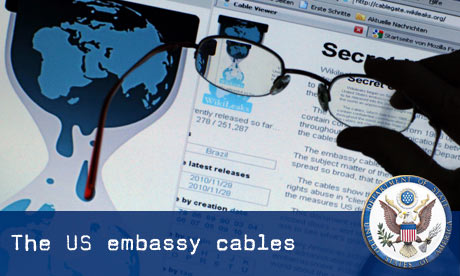How WikiLeaks altered the way we see the world in just a week
A torrent of information was released, leading to howls of protest from leaders and WikiLeaks being hounded offline

Shortly before 6.30pm on Sunday night, the first cracks appeared in the dam. The largest ever leak of US government classified documents streamed out online, revealing never publicly seen details about Iran, North Korea, Afghanistan and Russia.
Throughout the week the stream became a torrent of information about how US diplomats and foreign governments see the world. According to these classified cables, Saudi Arabia wanted Washington to bomb Iran, the UK harbours "deep concerns about the safety and security of Pakistan's nuclear weapons", and Russia is considered a "virtual mafia state" with its president, Vladimir Putin, accused of amassing "illicit proceeds" from his time in office.
But perhaps most embarrassing for Hillary Clinton who, as US secretary of state, is ultimately responsible for the content of most of the cables released so far, was a cable that revealed Washington is running a spying campaign targeted at the secretary general, Ban Ki-moon and the rest of the UN leadership, as well as the permanent security council representatives from China, Russia, France and the UK.
Clinton has spent much of the week trying to justify the operation – which was looking for top UN officials' passwords and credit card numbers , even DNA samples – to the press and in person to the UN secretary general.
As startling as the exposés were – the Saudi king urging America "to cut off the head of the snake", to launch a military attack on Iran's nuclear programme – it was as much the sense of a curtain lifting to reveal the world leaders not as wizards but as all too human, and that the private positions of those in power were often diametrically opposed to what they said in public, that made the cables so gripping – and perhaps so dangerous.
Clinton's immediate reaction was to strongly condemn the leak and say that "every country, including the US, must be able to have honest, private dialogue with other countries … When someone breaches that trust, we are the worse off for it."
Former presidential candidate, the Republican Mike Huckabee called for the execution of Bradley Manning, the 23-year-old US army intelligence analyst who is in custody at a military base in Virginia, facing trial for downloading the files while on duty in Iraq.
Fellow Republican Sarah Palin called Julian Assange, the fugitive founder of the WikiLeaks website, "an anti-American operative with blood on his hands" because she said previous leaks had included the identities of "more than 100 Afghan sources to the Taliban".
Yesterday Assange described Manning as "an unparalleled hero".
Several leaders who fared badly from the revelations were unconvinced the leaks were genuine. It was revealed that Russia was using mafia members to carry out operations like arms trafficking and that bribery functions as a parallel tax system for the personal enrichment of the police, officials and the KGB's successor, the FSB. Even before the revelations, Vladimir Putin said: "Some experts believe that somebody is deceiving WikiLeaks, that its reputation is being undermined in order for it to be used for political purposes. Such an opinion is being expressed here."
A day later, it emerged that US diplomats had reported suspicions that the Italian prime minister, Silvio Berlusconi, could be "profiting personally and handsomely" from secret deals with Putin.
President Ahmadinejad of Iran also denied that the Gulf Arab states are antagonistic towards his regime and said: "We don't think this information was leaked. We think it was organised to be released on a regular basis and they are pursuing political goals."
Turkish prime minister Tayyip Erdogan was so rattled that he even threatened to sue over allegations of corruption.
Rampant corruption in Afghanistan was revealed, including an incident last year when the then vice-president, Ahmad Zia Massoud, was stopped and questioned in Dubai when he flew into the emirate with $52m in cash.
In the UK, there were calls for Mervyn King, the governor of the Bank of England, to resign after it emerged he had been briefing the US ambassador to London, Louis Susman, about the "lack of experience" of David Cameron and George Osborne, and that they "had a tendency to think about issues only in terms of politics and how they might affect Tory electorability [sic]".
At least one major revelation gave some hopes for a more peaceful future, not least the suggestion that China is ready to accept Korean unification and is distancing itself from North Korea, which it describes as behaving like a "spoiled child".
Dispatches on North Korea showed that South Korea's vice-foreign minister was told by two senior Chinese officials that they believed Korea should be reunified under Seoul's control and that this view was gaining ground in Beijing.
Throughout the week, the US authorities increased the pressure on WikiLeaks. On Tuesday they announced an investigation into whether it had breached espionage laws, and on Wednesday they successfully pressured Amazon to stop hosting the site.
Joe Lieberman, chairman of the Senate's committee on homeland security, called on "any other company or organisation that is hosting WikiLeaks to immediately terminate its relationship with them".
Yesterday, the WikiLeaks website went offline for the third time this week
